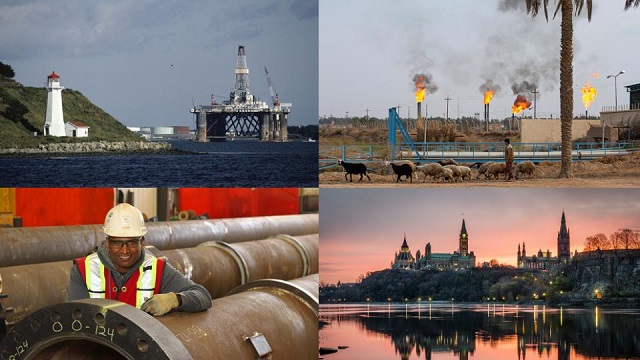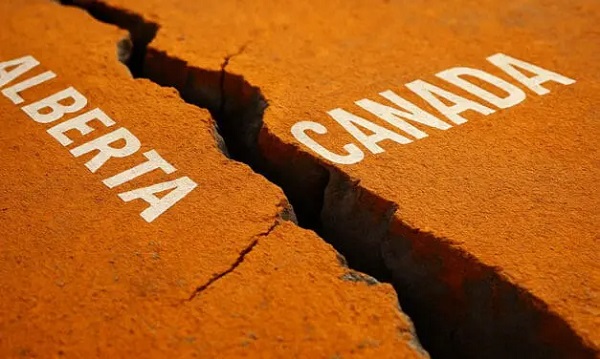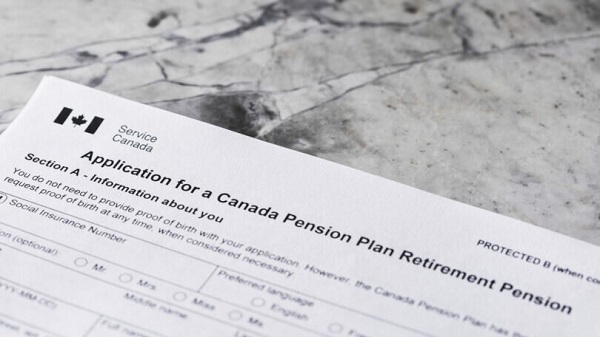Alberta
25 facts about the Canadian oil and gas industry in 2023: Facts 21 to 25

From the Canadian Energy Centre
One of the things that really makes us Albertans, and Canadians is what we do and how we do it. It’s taking humanity a while to figure it out, but we seem to be grasping just how important access to energy is to our success. This makes it important that we all know at least a little about the industry that drives Canadians and especially Albertans as we make our way in the world.
The Canadian Energy Centre has compiled a list of 25 (very, extremely) interesting facts about the oil and gas industry in Canada. Over the next 5 days we will post all 25 amazing facts, 5 at a time. Here are facts 21 to 25.
The Canadian Energy Centre’s 2023 reference guide to the latest research on Canada’s oil and gas industry
The following summary facts and data were drawn from 30 Fact Sheets and Research Briefs and various Research Snapshots that the Canadian Energy Centre released in 2023. For sources and methodology and for additional data and information, the original reports are available at the research portal on the Canadian Energy Centre website: canadianenergycentre.ca.
21. Projected Carbon Capture, Utilization and Storage (CCUS) in Canada has a bright future
Global carbon capture capacity and worldwide spending trends to date underline the fact that the future is bright for Canadian investments in CCUS. Assuming that appropriate government policies and regulations are put in place, Canada can expect to see further project announcements and increased investment in the technology. Canada will likely emerge as a CCUS heavyweight given the prevailing policy environment and the existential need for oil sands players to decarbonize. Rystad Energy estimates that Canada alone could account for around 20 per cent of cumulative carbon capture demand between 2023 and 2030.

Source: Derived from Rystad Energy
Nuclear and Renewables
22. Nuclear energy a stable source of electricity production in Canada
Nuclear power plants have been producing electricity in Canada since the 1960s. As of 2022, four nuclear power plants operate in Canada: three in Ontario and one in New Brunswick. Canada’s share of nuclear electricity production has remained relatively stable over the past few decades. In 1990, nuclear energy accounted for about 14.8 per cent of Canada’s electricity production; by 2021, this share had decreased only slightly to about 14.3 per cent.

Source: International Atomic Energy Agency
23. Canada’s trade in renewable products is modest
Trade is an essential component of Canada’s economic activity, accounting for about two-thirds of the economy and employing 3.3 million people. In 2021, Canada imported solar panel products with a value of CAN$653 million and wind turbine products with a value of CAN$91 million. The value of the solar panels and wind turbines Canada imported was much higher than the CAN$260 million export value for both products.

Source: Government of Canada, Trade Data Online
Liquefied Natural Gas (LNG)
24. Global LNG production projected to rise
Global liquefied natural gas (LNG) production is expected to reach nearly 720 million tonnes by 2035. That year the United States is projected to be the world’s leading LNG producer at 259 million tonnes, followed by Qatar at 121 million tonnes, and Australia at 78 million tonnes. Russian LNG supply was expected to grow to 54 million tonnes by 2035, but this is now in question, leaving opportunities for countries such as Canada to fill the void. In fact, by 2035, Canada could be the fifth largest LNG producer at nearly 33 million tonnes of LNG.

Source: Derived from Rystad Energy
25. Canadian LNG exports could help reduce global emissions
Asia is a significant source of CO2 emissions. Canadian LNG exports can help in reducing emissions from the Asian energy mix. If Canada increases its LNG export capacity to Asia, by 2050 net global emissions could decline by 188 million tonnes of CO2 equivalent per year. That would have the annual impact of taking 41 million cars off the road.

CEC Research Briefs
Canadian Energy Centre (CEC) Research Briefs are contextual explanations of data as they relate to Canadian energy. They are statistical analyses released periodically to provide context on energy issues for investors, policymakers, and the public. The source of profiled data depends on the specific issue. This research brief is a compilation of previous Fact Sheets and Research Briefs released by the centre in 2023. Sources can be accessed in the previously released reports. All percentages in this report are calculated from the original data, which can run to multiple decimal points. They are not calculated using the rounded figures that may appear in charts and in the text, which are more reader friendly. Thus, calculations made from the rounded figures (and not the more precise source data) will differ from the more statistically precise percentages we arrive at using the original data sources.
About the author
This CEC Research Brief was compiled by Ven Venkatachalam, Director of Research at the Canadian Energy Centre.
Acknowledgements
The author and the Canadian Energy Centre would like to thank and acknowledge the assistance of an anonymous reviewer for the review of this paper.
Alberta
Jann Arden’s Rant Will Only Fuel Alberta’s Separation Fire

From the Frontier Centre for Public Policy
By Lee Harding
In a fiery takedown of Alberta sovereigntists, Jann Arden may have poured gas on the sovereignty fire instead of dousing it. Lee Harding argues that her vulgar swipe ignored Alberta’s raw deal in Confederation, from lopsided equalization to federal overreach, and only deepens Western alienation. Rather than shaming Albertans into silence, her outburst might push them closer to the exit.
The singer’s foul-mouthed tirade won’t shame Alberta into silence. It’ll only push the province further toward the door
Jann Arden’s recent tirade against sovereigntist Albertans will probably do more to motivate them than set them back.
In an online rant, the Calgary-born-and-raised singer lowered public discourse a few notches.
“Hey, Alberta. Hey, you bunch of fu-king separatist wackos. How you doing? Feeling good about yourselves? You’re an embarrassment to this country. Everything you have, everything that you have enjoyed, cherished and benefited from, comes from being part of one of the greatest countries on the planet.”
Ha! Arden only embarrassed herself with her rudeness and ignorance.
Canada has been milking Alberta for a long time. In a 2024 study, the Fraser Institute showed that from 2007 to 2022, Albertans contributed $244.6 billion more in taxes and other payments to the federal government than they received in federal spending, more than five times as much as British Columbians or Ontarians. The other seven provinces were net takers.
Alberta is carrying Canada’s load by doing many things right, only to get zero respect and little benefit in return. For the past 10 years, Ottawa has done everything it can to undermine the energy sector through regulation and taxation, and encroach on provincial jurisdiction through legislation. Rather than feeding and protecting the goose that lays the golden eggs, it would rather pluck out its feathers.
The imbalance is nothing new. Since Confederation, most Canadian provinces have enjoyed jurisdiction over their natural resources. However, Alberta and Saskatchewan didn’t get that until 1930. When equalization began in 1957, Alberta received payments for eight years and never again. Quebec has been paid every year.
Ottawa went the route of more taxation, programs and debt, while Alberta took a more conservative approach. Its capacity to spend rose and fell with the price of oil. Just when Alberta hit another good wave, Ottawa launched the National Energy Program in the early 1980s—just to remind them who ruled the country and to whose benefit. Alberta got reduced profits and Eastern Canadians got cheap gas.
Alberta has been stuck in an abusive relationship for a long time and is wondering if it wouldn’t be better to be on her own. In the background is another suitor named Donald Trump, who would relieve Alberta of those pesky equalization payments and onerous regulations. The province would become the “cherished 51st state” instead of some western challenger to Central Canadian dominance that always needs to be put in its place.
Arden can’t see any of this. And her vitriol does nothing to make Albertans want to stay.
“You guys have your head so far up your as-es that you obviously can’t see what pri-ks you are,” Arden ranted. “The way you are treating your fellow citizens, your fellow Canadians, you guys are a bunch of creepy little pri-ks…
“Alberta will never separate from Canada. It’s never going to happen because people like me are going to stand up, throw their shoulders back, and keep fu-king yelling and keep standing up for what I know is right.”
Oh? Should Albertans stay because an insulting singer inspires a screaming mob? Will they suddenly find gratitude?
No. Abused Albertans have had enough. Their wants are not only reasonable, they’re good and fair policy. Canadians and their federal government should treat Alberta with proper respect, care about its grievances and feelings, and appreciate how they’d be a whole lot worse without her.
Lee Harding is a research fellow for the Frontier Centre for Public Policy.
Alberta
How Trump and Alberta might just save Canada

This article supplied by Troy Media.
 By Our View
By Our View
Canada faces a reckoning as Trump and Alberta disrupt long-held national assumptions
It may sound counterintuitive, but U.S. President Donald Trump and Alberta Premier Danielle Smith might be doing more to strengthen Canadian unity and prosperity than anyone in Ottawa.
Both are forcing a broken system long overdue for reform to face its flaws—Trump from the outside, Alberta from within. Trump’s revived protectionism is pushing Canada to confront its economic dependence on the United States, while Alberta’s bold demands are exposing the structural weaknesses of Canadian federalism. This unlikely convergence of pressure could lead to reform that strengthens the nation.
Trump’s renewed imposition of tariffs on Canadian imports, including a 25 per cent levy on most goods and a 10 per cent tariff on energy products, has
reignited trade tensions between the two nations. Trump has done this before: his 2018 tariffs on Canadian steel and aluminum sparked a brief but damaging trade war. His new measures are already disrupting industries reliant on crossborder supply chains, particularly in critical minerals.
However, there is a significant caveat: goods that comply with the United States-Mexico-Canada Agreement (USMCA)—the trade deal that
replaced NAFTA—are exempt from these tariffs. This exemption, initially set to expire on April 2, 2025, has been extended indefinitely, providing relief to industries that meet the agreement’s rules of origin. For example, auto parts manufactured in Canada that comply with USMCA standards are exempt from the newly announced duties.
Even with these carve-outs, the broader trade friction remains. This tension could be just what Canada needs. An unreliable U.S. trade partner may finally push Canadian policymakers to diversify markets, boost productivity and reduce our long-standing dependence on a single customer. The pain may be temporary, but the lessons could be permanent.
Meanwhile, Alberta is making it clear that business as usual will no longer be tolerated. Smith has issued a wide-ranging list of demands, including a repeal of Bill C-69—often called the “no more pipelines” bill by critics—which imposed stricter federal reviews on major energy projects; freedom to develop oil and gas resources without federal emissions caps; and the ability to opt out of industrial carbon taxes and net-zero vehicle mandates.
Some critics call Alberta’s stance reckless or anti-environment. But behind the rhetoric lies a growing frustration with a system that penalizes the very provinces driving Canada’s economy. Alberta isn’t seeking favours—it’s demanding fairness. If Ottawa fails to respond, the province is prepared to hold an independence referendum. That’s no longer an idle threat.
Canada’s deeper problems go well beyond Alberta. Interprovincial trade barriers fragment our economy. Energy infrastructure is blocked or stalled. And the equalization program sends billions to provinces that refuse to develop their own resources. Equalization is meant to ensure all provinces can deliver comparable public services, but the formula often penalizes growth-oriented provinces like Alberta while rewarding inaction. For decades, we’ve watched opportunity slip through our fingers, often by our own design.
External and internal forces are now creating the urgency we’ve lacked. Canadians are increasingly asking why internal trade isn’t as free as external
trade. Support for pipelines and energy independence is growing, even in provinces that previously opposed them. With global instability rising, secure
access to our own energy and markets is no longer optional—it’s essential.
It’s also hard to justify Quebec receiving $13 billion annually while banning fracking and refusing to develop its shale gas. The equalization formula discourages innovation, investment and self-reliance in recipient provinces. That’s not national solidarity—it’s economic dead weight.
This moment may feel tense, even dangerous. But real progress often begins with discomfort. Much like a labour negotiation or a market correction, shortterm conflict can lead to long-term renewal.
Canada has two choices: continue muddling along, or use this moment to reset and rebuild. That means cutting internal trade barriers. It means modernizing equalization. It means saying yes to energy infrastructure that strengthens national sovereignty. And above all, it means recognizing that the West’s prosperity is Canada’s prosperity.
Trump isn’t acting with Canada’s best interests in mind. Neither is Alberta trying to dismantle the country. But both are forcing us to look in the mirror. If we take this opportunity seriously, we may come out of it with a stronger, more selfreliant and united Canada.
Troy Media empowers Canadian community news outlets by providing independent, insightful analysis and commentary. Our mission is to support local media in helping Canadians stay informed and engaged by delivering reliable content that strengthens community connections and deepens understanding across the country.
-

 Addictions20 hours ago
Addictions20 hours agoMan jailed for trafficking diverted safer supply drugs, sparking fresh debate over B.C. drug policies
-

 Alberta22 hours ago
Alberta22 hours agoHow Trump and Alberta might just save Canada
-

 Bruce Dowbiggin17 hours ago
Bruce Dowbiggin17 hours agoCaitlin Clark Has Been The Real Deal. So Her WNBA Rivals Hate Her
-

 Business21 hours ago
Business21 hours agoThe Liberals Finally Show Up to Work in 2025
-

 Alberta20 hours ago
Alberta20 hours agoJann Arden’s Rant Will Only Fuel Alberta’s Separation Fire
-

 Banks18 hours ago
Banks18 hours agoCanada Pension Plan becomes latest institution to drop carbon ‘net zero’ target
-

 Daily Caller19 hours ago
Daily Caller19 hours agoThere’s A Catch To California’s Rosy Population Stats
-

 espionage2 days ago
espionage2 days agoTrudeau Government Unlawfully Halted CSIS Foreign Operation, Endangering Officers and Damaging Canada’s Standing With Allies, Review Finds



